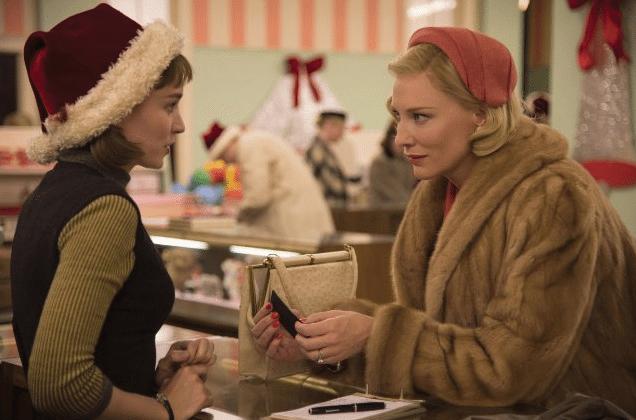By Richard von Busack
The title of Patricia Highsmith’s 1952 novel The Price of Salt contains a dead idiom—the price of salt was something people supposedly chatted about when they weren’t talking seriously. Girl talk, as they would have said once. The adaptation by Todd Haynes—his first feature film in eight years—is titled Carol. This same-sex romance, which almost hypnotizes, emulates the 1950s Hollywood melodrama of throbbing hearts, stiff jaws and immaculate wardrobes. But it’s missing something. Salt?
Carol (Cate Blanchett) is a fur-coated, upper-class housewife from New Jersey who meets the woman who will change her life across the counter at the toy shop at Frankenberg’s department store. Therese (Rooney Mara) is a lonely, shy and self-effacing shopgirl with a taste for photography. The two have a lunch that leads to deeper things.
One of the problems facing this liaison is that Carol isn’t quite single—she’s in the middle of divorce and custody hearings with her husband Harge. It’s short for Hargess, but it would seem to be a combination of “harsh” and “large.” Harge’s own side of the triangle doesn’t add tension—Harge is a pushy, sullen WASP, a life-ruiner who wants to grab Carol’s daughter Rindy.
When the ladies makes a decision to flee for a time—to just get in the car and drive—it precipitates both the slow-simmering affair and the crisis that endangers it. The couple doesn’t pay sufficient attention to a travelling salesman who tries to befriend them during their winter trip through Iowa’s most nowhere small towns. This peddler calls himself “Tommy Tucker” (Cory Michael Smith, who plays the deranged Edward “The Riddler” Nygma on Gotham).
The last time Haynes dove for the wreckage of ’50s cinema in a film, in 1992’s Far From Heaven, I wrote, “It sure gives you a turn seeing the age you were born into treated as if it were as far away as Elizabethan England.” Twenty years later, Haynes makes this near past seem even more quaint.
It may just be that Blanchett—cast in a mad housewife role that Joan Crawford would have done once—is so scarlet of mouth, so full of force and stride, that she breaks the frame. It’s hard to believe this intimidating lady as a woman who can be shamed. Mara is such a quiet little blank, in her lonely garret. Therese at one point denounces herself as a woman who says “yes” to everything—so Carol has to do the thinking for both of them, in the Casablanca sense.
The film has moments that get you in the throat, as when, after a troubled date, Therese weeps to herself on the train, doubled by her reflection on the dark window. But it’s a cold fish of a film, beautiful but taxing. Just as the actors are on their marks for every scene, the audience always knows where it stands.






